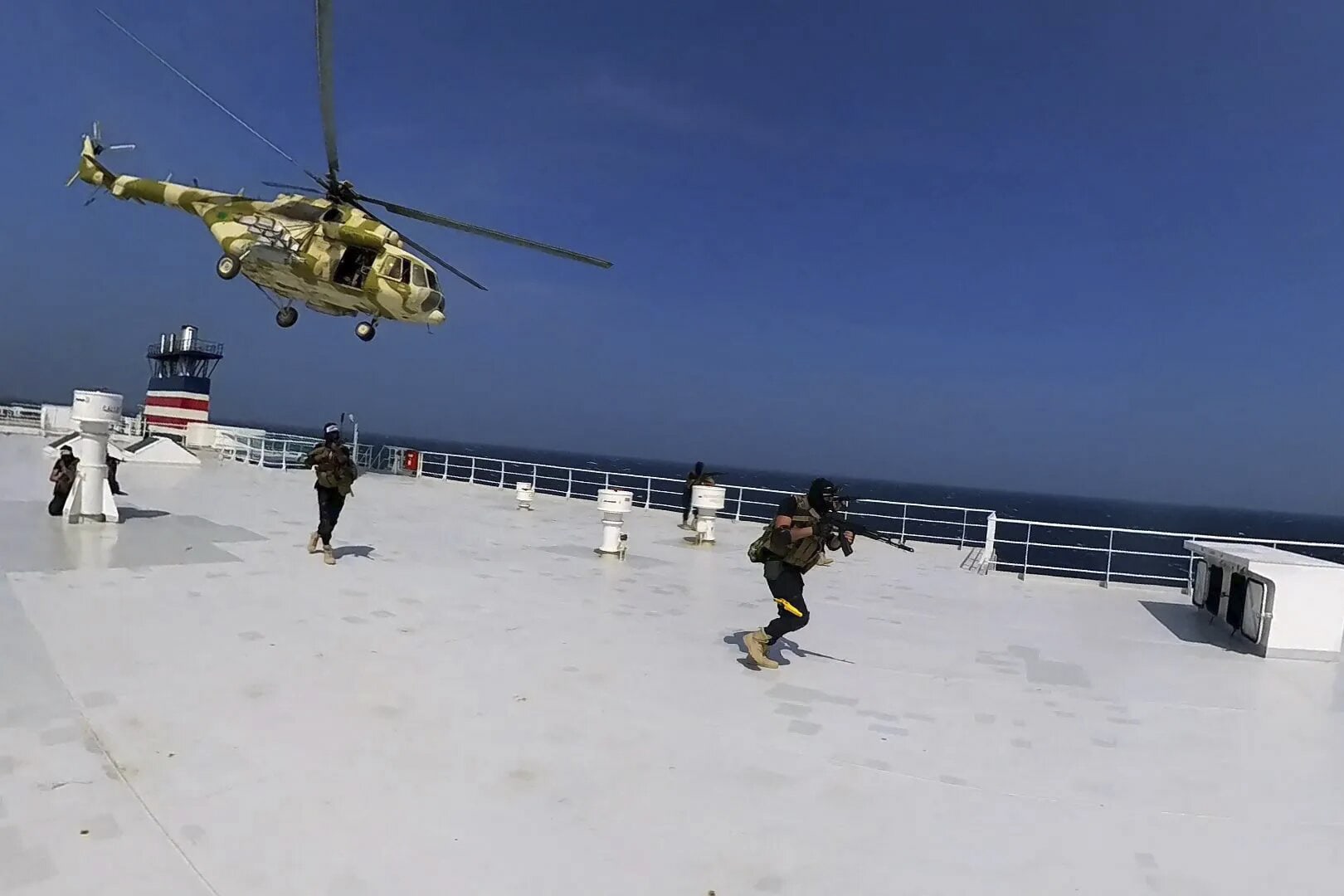
Houthi militants while hijacking the cargo ship (screenshot)
آخر تحديث في: 22-11-2023 الساعة 3 مساءً بتوقيت عدن
If the Houthis’ attacks will at some point extend to American targets in the Red Sea, the Biden administration will likely retaliate as has been done in Syria.
Dr. Marta Furlan (South24)
Since the start of the war between Israel and Palestinian factions last October, the Houthis – the Zaydi Shia armed group that controls [North] Yemen and belongs to Iran’s Axis of Resistance – launched a series of rocket and drone attacks against Israel, targeting the Israeli Red Sea port city of Eilat. While the rockets were promptly intercepted, they certainly sent a clear message on where the Houthis are standing – not only with respect to the war between Israel and the Palestinian factions, but in the wider regional constellation of state and non-state armed groups.
The Houthis’ latest provocation
Following those earlier missile and drone attacks, on Sunday November 19 the Houthi’s involvement in the Hamas-Israel hostility took a new turn: after repeatedly threatening that Israeli-flagged, Israeli-owned, and Israeli-operated ships passing through the Red Sea would be considered legitimate targets, the armed group did hijack a commercial ship. Some Houthi armed members reached the ship using small fast boats, while others landed on the ship’s dock by helicopter.
According to well-informed reports, the Bahamas-flagged ship – which was en route from Turkey to India at the time of its hijacking – is registered under a Britain-based firm, which is partially owned by Israeli tycoon Abraham Ungar. Prior to this episode, a ship linked to Ungar experienced an explosion in 2021 in the Gulf of Oman, which was attributed to Iran at the time.
The hijacked vessel, the Galaxy Leader, was leased out to a Japanese company and had an international crew on board, including Ukrainians, Bulgarians, Filipinos, and Mexicans. According to reports, no crewmember is of Israeli nationality. The Houthis, however, after taking the Galaxy Leader to the Yemeni coast, said that they had hijacked an “Israeli ship”. They also let the world know that they would deal with its crew members “in accordance with the teachings and values of our Islamic religion.”
Following the episode, the Houthi military spokesperson Yahya Saree said that the seizure of the ship was in response to the “heinous acts against our Palestinian brothers in Gaza and the West Bank” and added that “if the international community is concerned about regional security and stability, rather than expanding the conflict, it should put an end to Israel’s aggression against Gaza.”
Reactions from the region and beyond
The US National Security Council called the attack a “flagrant violation of international law", demanding the release of the ship and its crew and warning that it will take appropriate steps with its allies, including within the UN framework. Japan, which was operating the boat, also said through its Foreign Minister, Yoko Kamikawa, that it “strongly condemns” the ship’s hijacking and urged “Saudi Arabia, Oman, Iran and other countries concerned to strongly urge the Houthis for the early release of the vessel and crew members.”
In the region, the Israeli Prime Minister, Benjamin Netanyahu, called the episode a “grave event” and rapidly pointed the finger to Iran, referring to the hijacking as “another act of Iranian terrorism which expresses a leap forward in Iranian aggression against citizens of the free world, and creates international implications when it comes to the security of global shipping routes.”
For his part, Iranian Foreign Minister Hossein Amir-Abdollahian maintained that “We have seen the first stage of expansion of the scope of the war by the resistance groups who make their own decisions.” With these words, he de facto distanced himself and his country from the attacks on Israel and the US which have been launched by Iran-allied armed groups over the past month not only in Yemen, but also in Iraq and Syria.
Similarly, Iran Foreign Ministry's spokesman Naser Kanaani said at a press briefing that "We have said multiple times that resistance groups in the region act independently and spontaneously based on their interests and that of their people." He added that Israeli claims were aimed at diverting attention away from Israeli's "irreparable defeat" in its battle against Hamas militants in the Gaza Strip.
Significantly, these comments from Amir-Abdollahian and Kanaani clearly show the extent to which Iran is engaged in a delicate balancing act: it wants to maintain pressure on Israel on multiple fronts through its allied armed groups, while being careful not to overplay its hand and reach a “point of no return” that would be detrimental to Teheran.
What next?
As was noted in a previous piece, the Houthis’ missile and drone attacks against southern Israel do not represent a serious security threat for the Jewish state. Their value is mostly symbolic. Their purpose is to solidify the Houthis’ alignment with Iran, garner support among a widely critical Yemeni public, and enhance the Houthis’ credibility in the Muslim world – especially at a time in which more countries (predominantly among them, Saudi Arabia) seemed to be considering normalization with Israel. Moreover, the Houthis are using their drone and missile attacks to bolster their negotiating position in the peace talks with Saudi Arabia, which has been desperately trying to put a definitive end to its disastrous Yemeni campaign.
Conversely, the Houthis’ attacks against commercial ships transiting through the Red Sea do represent a security threat and do pose serious concerns – not only to Israel, but also to the United States, to regional countries, and to any other state and private company whose economic interests pass through the Red Sea. In other words, by attacking and hijacking ships along one of the world’s busiest and most important shipping routes (something that the Houthis can fairly easily do through their shore-to-sea missiles, naval mines, fast small boats, and helicopters), the Houthis are provoking an escalation that might adversely impact the economy, stability, and security of the region and beyond.
What responses can be expected to the Houthis’ threats? The answer will in part depend on whether the episode of the Galaxy Leader will remain an isolated occurrence or whether the Houthis – as they have indeed been promising – will repeat the hijacking operation against other vessels in the weeks to come.
Even before the Houthis’ pirate action, the Chief of the Israel Air Force, Commander Tomer Bar, during a press conference stated that his country is ready “to operate throughout the entire Middle East.” While Yemen was not mentioned explicitly in his public address, the fact that the statement came in the context of the Houthis’ missile and drone attacks against Eilat leaves little doubt on who Bar was referring to.
However, for the time being, Israeli priorities remain firmly focused on the Gaza front with Hamas and the northern front with Hezbollah. Unless a dramatic Houthi-led escalation is observed in the Red Sea and unless future Houthi attacks manage to hijack Israeli ships and kidnap Israeli crewmembers, there is little reason to believe that Israel will expand its attention and involvement to the southern front. In fact, while Israel certainly has the capacity to confront the Houthi threat in the Red Sea, having to divert resources to a new front in the middle of an intense military campaign would be far from an ideal scenario for the Israelis. Should that become the case, it can be expected that Israel will attempt to pull the Americans in as well.
For its part, since the start of the Hamas-Israeli conflict, the United States has been interested in avoiding an escalation of hostilities that might turn the war into a full-scale regional confrontation. Driven by these considerations, the US warned Iran and its proxies that any attack against its forces would not be tolerated and would be met with retaliation. As a proof of the credibility of those warnings, a series of attacks (more than 60) against American targets over the last few weeks promptly led to US airstrikes on Iran-affiliated facilities in Syria.
In the Red Sea, should the threat posed by the Houthis to regional security and stability continue unabated, the United States would probably start by considering – and approving – the re-listing of the group as a Foreign Terrorist Organization (FTO). Beyond that, if the Houthis’ attacks will at some point extend to American targets in the Red Sea, the Biden administration will likely retaliate as has been done in Syria. Additionally, it is important to note that whether American personnel gets killed in future such attacks will be the threshold that would inevitably lead to an American military intervention.
Research Program Officer at Free the Slaves (FTS), a non-governmental organization working to end human trafficking and modern slavery. She is also a Non-Resident Fellow at the Orion Policy Institute (OPI) and a Fellow at the Center on Armed Groups. (@MFurlanBuckl)

قبل 3 أشهر

قبل 3 أشهر